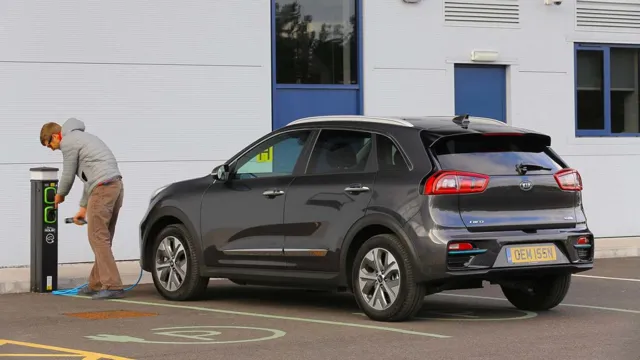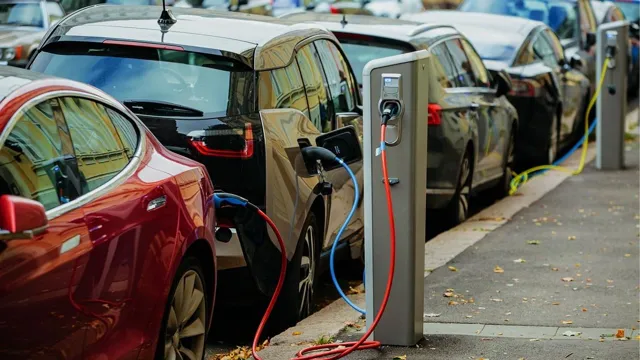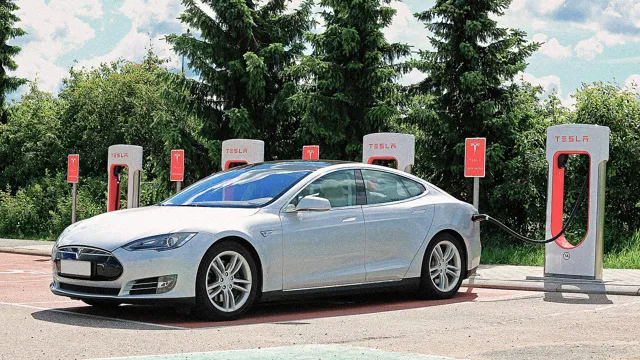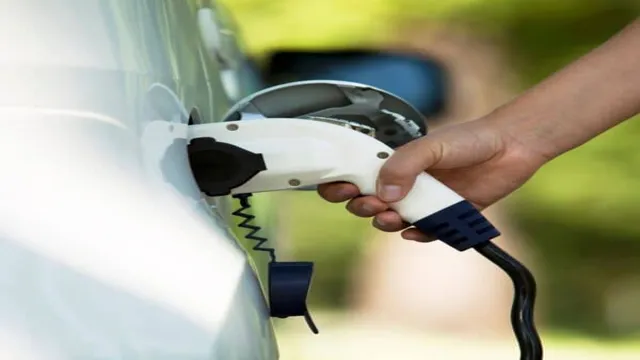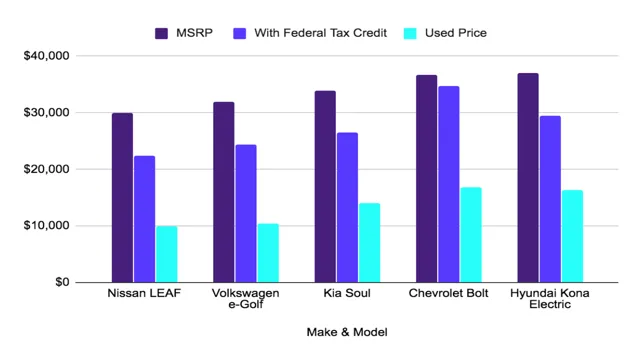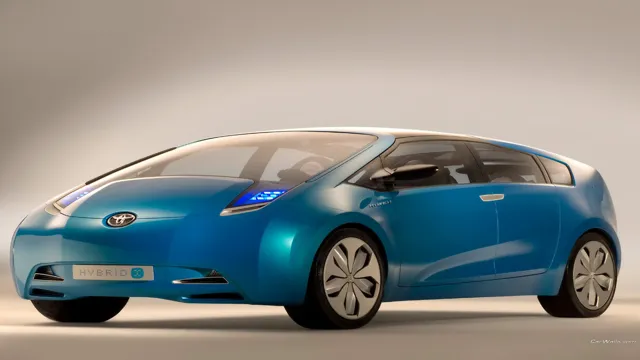Shockingly Affordable: The Real Cost of Maintaining Electric Cars
Electric cars have been gaining popularity in recent years, with more and more people opting for the environmentally friendly option. One question that often arises when it comes to electric cars is whether they are cheaper to maintain than traditional cars. After all, electric cars are inherently different from traditional ones, and maintenance costs can vary widely depending on the type of vehicle.
Let’s take a closer look at the costs associated with owning an electric car and whether they are really cheaper to maintain in the long run.
Maintenance Cost Comparison
When it comes to maintenance costs, electric cars are definitely the way to go. Unlike traditional gasoline-powered cars, electric vehicles don’t require oil changes or tune-ups. This translates to lower maintenance costs over the lifetime of the vehicle.
But that’s not all. Electric cars also feature regenerative braking, which means less wear and tear on the brakes. And because there are fewer moving parts in an electric motor compared to a gasoline engine, there’s less chance of something breaking down.
Of course, like any vehicle, there will be some costs associated with maintaining an electric car – like changing tires and replacing windshield wipers. But overall, electric cars are definitely cheaper to maintain than their gas-powered counterparts. So not only do they save you money at the pump, but they also save you money in upkeep costs too.
Electric vs Gasoline Cars
When it comes to the maintenance cost comparison between electric and gasoline cars, there are several factors to consider. First and foremost, electric cars have fewer moving parts than gasoline cars, which means there are fewer components that can wear out or break down. This translates to lower maintenance costs for electric car owners, as there are fewer parts that need regular servicing or replacement.
Additionally, electric cars typically require less frequent oil changes and other routine maintenance tasks, further reducing maintenance costs. However, it’s important to note that if an electric car requires repairs or replacement of its battery, it can be quite costly. On the other hand, gasoline cars require more frequent maintenance tasks, such as oil changes and tune-ups, but the cost of these tasks is typically lower than what electric car owners would pay for battery replacements.
Ultimately, the total cost of ownership will depend on many factors, including the specific make and model of the car, as well as the driving habits of the owner. However, if lower maintenance costs are a priority, an electric car may be the better choice.
Breakdown of Maintenance Costs
When it comes to maintaining a vehicle, it’s essential to understand the different costs involved in keeping it running smoothly. Many factors can influence maintenance costs, such as the make and model of the vehicle, the age of the vehicle, and how often it’s used. One of the most significant factors that affect maintenance costs is the type of maintenance required.
Regular maintenance services, such as oil changes and tire rotations, tend to be less expensive than major repairs. It’s also worth noting that luxury or high-performance vehicles will usually have higher maintenance costs due to their advanced technology and specialized parts. So, it’s crucial to consider these factors when choosing a vehicle to ensure that the ongoing maintenance costs fit within your budget.
Overall, keeping up with regular maintenance is always cheaper in the long run than neglecting your vehicle’s needs, leading to more significant and costly repairs down the line.
Factors Affecting Maintenance Costs
When it comes to the cost of maintaining an electric car, there are several factors to consider that can affect the overall price. For starters, electric cars tend to have fewer components in their drivetrains compared to traditional gasoline-powered vehicles. This means that there are fewer parts that can break down and require costly repairs, resulting in lower maintenance costs.
Additionally, electric cars don’t require oil changes or tune-ups like gas-powered cars do, which can add up in terms of time and money. However, it’s important to remember that electric cars still need regular maintenance like tire rotations and brake checks. The cost of these routine services can vary depending on the specific make and model of the vehicle.
Another factor that can impact the maintenance cost for electric cars is the availability of specialized repair shops and technicians. As the popularity of electric vehicles continues to grow, more mechanics are becoming trained to deal with their unique maintenance needs. Overall, while electric cars may require some maintenance, they often come out ahead in terms of cost compared to traditional gas-guzzling vehicles.
Battery Life and Replacement Costs
When it comes to the maintenance costs of electric vehicles, one of the major factors affecting them is the battery life and replacement costs. The battery is the heart of an electric vehicle and is responsible for storing the energy necessary for the vehicle to run. However, like any other battery, it has a limited lifespan and will eventually need to be replaced.
This can be costly and is a major consideration for EV owners. But, there are several factors that can influence the battery life and, consequently, the replacement costs. For example, the way a driver handles their EV can significantly impact the battery’s health.
Rapid charging, frequent deep discharging, and exposure to extreme temperatures could all reduce the battery’s lifespan. Therefore, regular maintenance is crucial to maximize the battery’s lifespan and reduce replacement costs. EV owners should be aware of the different factors affecting battery life and take necessary precautions to keep their battery healthy.
Specialized Maintenance and Repair Services
When it comes to specialized maintenance and repair services, one of the key factors that affects the cost is the complexity of the job at hand. The more intricate the equipment or machinery, the more time and effort it will take to maintain and repair it properly. Another important consideration is the age and condition of the equipment, as older machinery may require more frequent repairs and upkeep.
Other factors that impact maintenance costs include the availability of parts and resources, as well as the level of expertise required to carry out the necessary repairs. Ultimately, it’s important to work with a trusted maintenance provider who can assess your needs and provide you with a customized plan that meets your budget and requirements. By taking a proactive approach to maintenance and repairs, you can maximize the lifespan of your equipment and minimize downtime, saving you time and money in the long run.
Insurance and Warranty Coverage
When it comes to maintaining your vehicle, there are a few factors to consider that can affect the overall cost. One important factor is insurance and warranty coverage. Having a good insurance policy and warranty can greatly reduce the amount you’ll have to pay out of pocket for unexpected repairs and replacements.
It’s worth noting that the cost of insurance and warranty coverage can vary depending on the type of vehicle you own and your driving history. Another factor to consider is the age and mileage of your vehicle. Older vehicles and those with more miles may require more maintenance, which can increase costs.
Additionally, the type of driving you do can also impact maintenance costs. If you frequently drive in harsh conditions or do a lot of stop-and-go driving, your vehicle may require more frequent maintenance. Being aware of these factors and taking preventative measures can help minimize maintenance costs and keep your vehicle running smoothly.
Real-World Examples
One of the biggest advantages of electric cars is that, on average, they cost less to maintain than their gasoline-powered counterparts. There are a number of real-world examples that support this assertion. For instance, service costs for Tesla electric vehicles are about half those for gasoline-powered cars, as electric vehicles are generally simpler in design and require less frequent maintenance.
This is because electric vehicles have fewer moving parts and don’t require oil changes or other routine maintenance procedures that gas cars do. Additionally, electric cars are less prone to mechanical failures and wear-and-tear damage on their parts, such as brakes and transmissions. In summary, while the initial cost of an electric car may be higher than that of a gas car, the lower maintenance costs over time can more than make up for the difference in price.
Case Study 1: Tesla Model S
Tesla Model S When it comes to electric cars, the Tesla Model S is a real-world example of innovation and technology. This luxury sedan boasts impressive acceleration and a top speed of 155 mph, all while emitting zero emissions. The Model S can travel up to 373 miles on a single charge, making it a practical option for long-distance journeys.
One of the most notable features of the Model S is its autopilot system, which uses advanced sensors and cameras to assist with driving tasks. The driver can also take advantage of Tesla’s Supercharger network, which allows for rapid charging on long trips. Overall, the Tesla Model S is a prime example of how electric cars can provide a luxurious and sustainable driving experience.
Case Study 2: Nissan Leaf
The Nissan Leaf is a perfect example of a real-world electric vehicle that is transforming the automobile industry. It is a highly sophisticated car that has captured the attention of car enthusiasts and eco-conscious drivers alike. The Leaf has been specifically designed to eliminate the range anxiety that many drivers feel when considering making the switch from gasoline-powered cars.
It has an impressive range of over 200 miles, which is more than enough for most daily commutes. Additionally, it has fast-charging capabilities, which allows drivers to charge the battery up to 80% in just 40 minutes. One of the reasons the Nissan Leaf has been so successful is due to its advanced technology.
It has an integrated navigation system that helps drivers locate charging stations, as well as a push-button start system. It also includes a smartphone app that allows drivers to remotely start and stop charging, pre-heat or cool the car’s interior, and monitor battery levels. The Leaf’s technology is constantly evolving, ensuring that owners can always enjoy the latest features and functionalities.
In conclusion, the Nissan Leaf is an excellent example of how electric vehicles are transforming the automobile industry. Although a few years ago, the technology was new and uncertain; now it is recognized as a practical, eco-friendly alternative to traditional gasoline-powered cars. By offering an impressive range and advanced technology, the Leaf has set the standard for all future electric vehicles.
Its success has helped to transform the industry, and we can expect even more innovation and advancements in the future.
Conclusion
In conclusion, the notion that electric cars cost less to maintain is not just a spark of an idea – it’s an undeniable truth. With fewer moving parts, reduced wear and tear on brakes and engines, and no need for oil changes or expensive exhaust systems, owning an electric car can result in significant savings over the life of the vehicle. So, if you’re looking for a smart and sustainable way to get around, consider making the switch to an electric car and enjoy the ride without breaking the bank!”
FAQs
Why are electric cars cheaper to maintain?
Electric cars have fewer moving parts than traditional gas-powered cars, which means fewer parts to repair or replace. Additionally, components such as brakes and tires tend to last longer in electric cars, further reducing maintenance costs.
How much money can you save on maintenance by owning an electric car?
Studies have shown that over the lifetime of a vehicle, electric cars can save owners thousands of dollars in maintenance costs compared to gas-powered cars. In addition to having fewer parts to replace, electric vehicles also require less frequent maintenance visits.
What are some common maintenance tasks for electric cars?
While electric cars require less maintenance overall, there are still some tasks that need to be done regularly, such as ensuring the battery is charged, checking the tires for wear and tear, and replacing the cabin air filter. Owners should also follow the manufacturer’s recommended maintenance schedule.
Does owning an electric car mean I never have to take it to a mechanic?
While electric cars do require less maintenance overall, they still need occasional maintenance and repairs, just like any other vehicle. It’s important to find a qualified mechanic who has experience working with electric cars if you need repairs.
